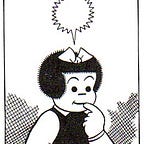The Four-Letter Word That Changed Advertising History
No, not that four-letter word.
No, not any of the four-letter words you’re thinking of.
The four-letter word is just. And the product being advertised was potato chips.
In 1963, the Young & Rubicam ad agency hired the actor Bert Lahr — still remembered fondly as the Cowardly Lion in The Wizard of Oz (1939) — to star in a series of TV spots for Lay’s potato chips. The point of the ads: the chips are so good, they’re addictive. The tagline: “Betcha can’t eat one.”
Listen closely to this TV commercial from early in the ad campaign:
Ignore the caption and listen:
“Betcha can’t eat one.”
The devil you say! Of course Bert could eat one chip! When he wants more than one, though, he loses the bet.
That proved to be too subtle for viewers, and in subsequent ads Y&R made a small but significant change in the dialogue. Instead of “Betcha can’t eat one,” the line now read “Betcha can’t eat just one.”
The modified slogan has endured for more than five decades, and is the line people associate with the Lay’s brand. Even Barry Popik’s meticulously researched popular-history site The Big Apple, in an otherwise well-documented entry, omits the original version of the slogan.
What’s the difference between the original and modified slogans?
One is complicated. It’s the first ordinal number in the English-language counting system. It can mean “an unidentified person” (“One Never Knows”). It can mean “a certain…
